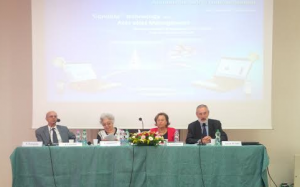EVENTS Religions and Education
What added values can religions bring to education? How to reconcile the tradition of Jewish studies with new educational models? How to define the right behavior for a teacher and for a student? These questions were the focus of the two-day seminar (September 9-10) “Judaism and European culture. Religions as education systems” devoted to “Judaism and the Great Educators of the ‘900” and hosted in Rome by The Pitigliani Jewish Center with the supervision of University La Sapienza, the Jewish Community of Rome and the Union of Italian Jewish Communities. Organized by the Institute of Psychology and Intercultural Onlus, the seminar was introduced by Professor Antonella Castelnuovo of La Sapienza University.
Rabbis, educators, teachers and psychologists spoke about several topics: a panel discussing tradition and the process of learning was moderated by psychologist and educator Clotilde Pontecorvo.
Antonella Castelnuovo said: “Today we want to study how religions can make an improvement in society, focusing in particular on Judaism. The Jew was always identified as the other, Jews represent the oldest otherness in Europe; what Simmel called as ‘the guest who stays’. This characteristic element allowed them to live always in a double dimension.”
The Chief Rabbi of Rome, Riccardo Di Segni gave a speech significantly entitled “There is no Future without Education”: “Education – he explained – is a fundamental concept of Judaism and is articulated in the action of acceptance and transmission, both regarded as duties.”
“The paradox to be reported,” said Rabbi Di Segni “is that the obligation to study Torah, so fundamental in Judaism, has created an Italian Jewish Community where studying is essential, but it is no longer a study devoted to the Torah. Italian Judaism, after some generations of great scholars in many disciplines, not only failed to create great Torah scholars, but has stopped creating even great scholars in other disciplines.”

